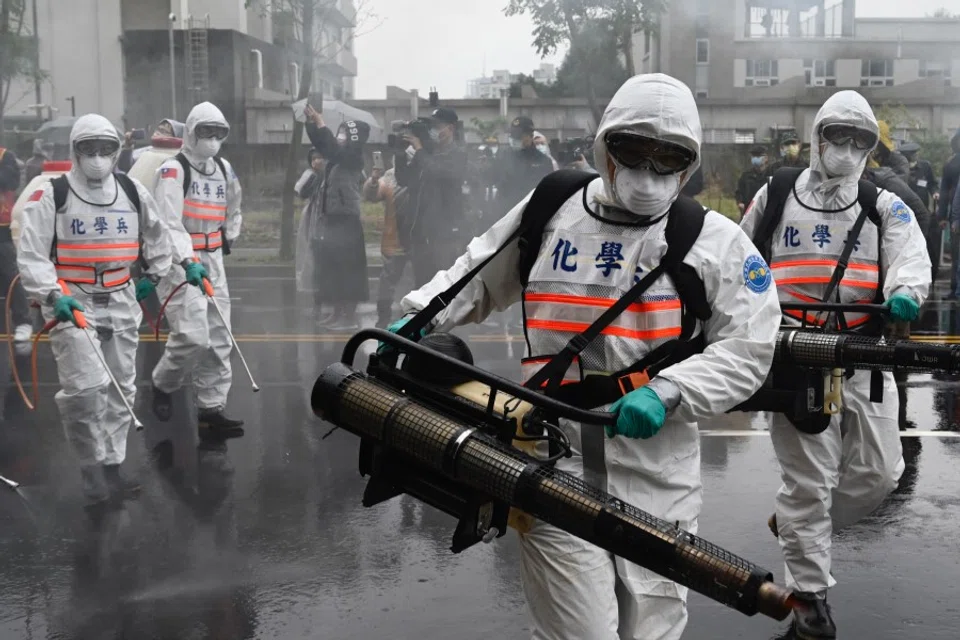Taiwan's 'epidemic diplomacy' may invite reprisals from Beijing
Turning a corner in recent days in the fight against Covid-19, China may now take stock of those who have been nasty or nice during the crisis. Taiwan may have won international praise and recognition for its efforts against the Covid-19 epidemic, but incurred Beijing's ire in the process. Zaobao correspondent Ng Soon Kiat finds out more about how mainland China might respond, and how things might turn difficult for Tsai Ing-wen's second term in government.

Domestic support for the Democratic Progressive Party (DPP) government is at an unprecedented high due to the good job it has done in controlling Covid-19. This may be a good opportunity for Taiwan to come out of mainland China's shadow and raise its profile and join international organisations. But some analysts think that as the epidemic eases in mainland China, Beijing may be more harsh in its political reprisals, creating a major political challenge for Taiwan President Tsai Ing-wen as she enters her second term.
Taiwan's tally of confirmed cases stands at 59 as of 15 March. Compared to its neighbours, the situation in Taiwan is relatively mild and stable. The DPP government has pushed out many control measures, including promptly ramping up border controls, requisitioning face masks and selling them on a name-based rationing system, and giving daily media updates on the epidemic. All this has won international praise and increased the popularity of the DPP government.
But even as Taiwan is immersed in praise, the official media in mainland China is asserting that the Western media is playing things up in collaboration with the Tsai administration.
According to Taiwan's Ministry of Foreign Affairs, as of last week, there were some 234 positive media reports from over 20 countries on Taiwan's epidemic efforts. Major Western newspapers such as The Wall Street Journal, Washington Post, and The Guardian all ran editorials emphasising that Taiwan should not be left out of the World Health Organisation (WHO). The Ministry of Foreign Affairs said, "The friendly international media reports show global support for Taiwan being added to the WHO."

International opinion on epidemic report card a new battleground
Taiwan's foreign ministry, embassies, and representative offices have lost no time in writing to international media to drive publicity.
Minister of Health and Welfare Chen Shih-chung, who leads Taiwan's epidemic control efforts, yesterday expanded Taiwan's "epidemic diplomacy" by meeting with foreign representatives in Taiwan to give a brief on Taiwan's epidemic situation and control efforts, and to discuss with these countries how to work together on controlling the epidemic at the borders.
As Taiwan and mainland China carry on their rivalry, international opinion has become the latest battleground between both sides.
But even as Taiwan is immersed in praise, the official media in mainland China is asserting that the Western media is playing things up in collaboration with the Tsai administration. On 14 March, People's Daily ran a commentary by senior journalist Wang Ping titled "What is the Western Media's Agenda in Playing Up Taiwan's Epidemic Control Efforts?" Wang claimed that while Western media assessed Taiwan as being successful in controlling the epidemic, the truth was that the DPP is hostile towards mainland China, and is taking advantage of the epidemic to encourage sentiments against mainland China, practically cutting off cross-strait interaction. "There is no finesse to speak of in the unsophisticated and inelegant control efforts of the DPP, and one cannot see why some Western media is praising the 'Taiwan experience'," Wang said. "And it has even less to do with 'democratic control efforts'."
As Taiwan and mainland China carry on their rivalry, international opinion has become the latest battleground between both sides. Taiwan is fighting to expand its international space, while mainland China is ramping up its declarations that the epidemic is under control, and advocating mainland China's epidemic control model as a leading example for the world.

Professor Spencer Yang Tai-Shuenn of Chinese Culture University thinks that the Tsai administration - which was re-elected based on anti-mainland sentiment - will seize this opportunity to push its desire for sovereignty and independence, and consolidate its domestic support. He told Lianhe Zaobao: "Even if the control efforts do not work, the DPP government will have something to say, such as complaining that the mainland is obstructing Taiwan from joining the WHO, leading to a gap in control efforts. But there is no way mainland China will give in on the issue of Taiwan joining the WHO, and the DPP's efforts will come to nothing in the end."
Cross-strait relations after the epidemic do not look good, and it is difficult to predict how hard mainland China's political reprisals will be.
Professor Yan Jiann-fa of the Chien Hsin University of Science and Technology, who used to be the director of Chinese Affairs for the DPP, thinks that even if the effects are limited, Taiwan's raising its profile and engaging in "epidemic diplomacy" is a good opportunity to make friends. He said in an interview with Lianhe Zaobao, "The WHO has been bought by mainland China, so it doesn't matter if Taiwan doesn't join. What Taiwan needs is information. We can leverage the epidemic to strengthen ties with other countries. Since we cannot move out, we can allow others to move in. We are confident that we will be able to come up with a new model of global interaction. As for mainland China, let's not provoke it."
However, political commentator Chen Sung-shan thinks that after the epidemic ends, hostility will rise between the governments on both sides of the Taiwan Strait and the people's sentiments will also take a hit. Cross-strait relations after the epidemic do not look good, and it is difficult to predict how hard mainland China's political reprisals will be. He said, "With about two months to go until President Tsai takes office again on 20 May, how do we handle the next wave of possibly extreme pressure from across the strait? Even as the government comes together against the epidemic, that is a serious political question it should prepare for."



![[Photos] Fact versus fiction: The portrayal of WWII anti-Japanese martyrs in Taiwan](https://cassette.sphdigital.com.sg/image/thinkchina/3494f8bd481870f7c65b881fd21a3fd733f573f23232376e39c532a2c7593cbc)

